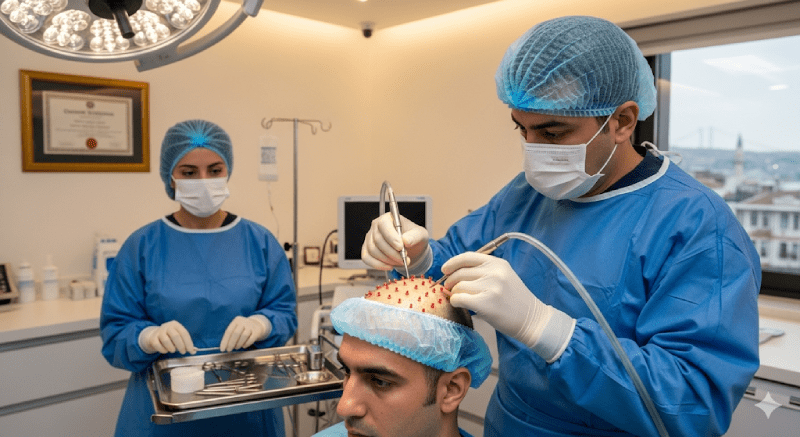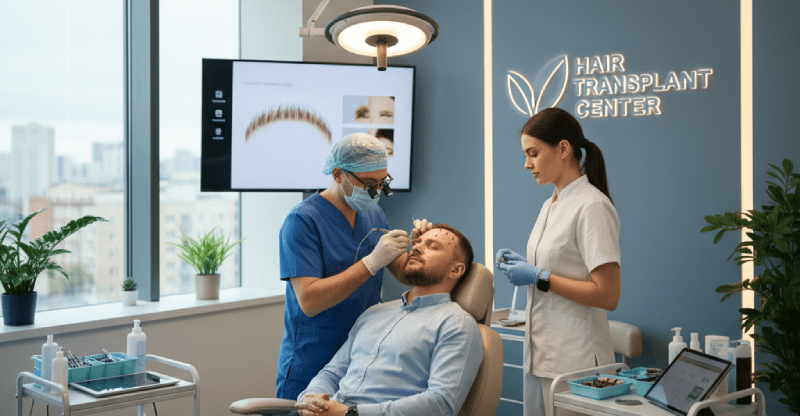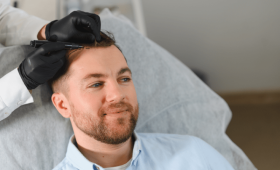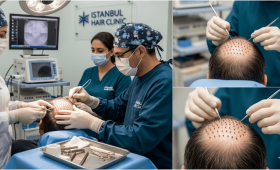What is hair transplantation?
Hair transplantation is the process of surgically transferring hair follicles, typically taken from the back or sides of the head where they are genetically resistant to balding, to bald or thinning areas using micro-surgical techniques. The goal of this procedure is to provide a permanent solution, helping the patient achieve a natural and aesthetic appearance. In addition to being an effective solution for hair loss, hair transplantation also helps boost an individual’s self-confidence. With modern techniques, the risk of scarring after the procedure is minimized.
Who are suitable candidates for hair transplantation?
Suitable candidates for hair transplantation are generally individuals over the age of 20 whose hair loss has stabilized. Having a sufficient number of healthy, high-quality hair follicles in the donor area (the back or sides of the head) is one of the most important conditions for success. Individuals with chronic illnesses such as heart disease or diabetes must get prior approval from their doctor. Also, hair transplantation is evaluated based on the type of hair loss; it usually yields successful results in cases of hormonal or genetic hair loss.
What are the hair transplantation methods?
The most common hair transplantation methods used today are FUE (Follicular Unit Extraction) and DHI (Direct Hair Implantation) techniques. FUE involves collecting hair follicles one by one and implanting them into channels that have been opened, while the DHI technique allows for direct implantation of the hair follicles using a special pen (Choi implanter). Both methods have their own advantages and disadvantages. Which technique to use is determined by the physician based on the patient’s hair structure, degree of hair loss, and expectations.
How is the FUE technique applied?
The FUE technique is based on the principle of extracting hair follicles one by one from the back of the head or other body areas using tools called a micromotor or manual punch. These extracted follicles are stored in special solutions before being implanted into the bald area. During the implantation process, micro-channels are opened, paying attention to the direction, angle, and density of hair growth, and the collected hair follicles are placed into these channels. FUE is known as a technique that leaves no visible scarring.
What is the DHI technique and how is it different?
The DHI (Direct Hair Implantation) technique, like FUE, involves taking hair follicles one by one but is performed using a special pen (Choi Implanter Pen) that allows for the simultaneous opening of channels and implantation.
In this technique, hair follicles are placed directly into the recipient area immediately after being extracted, which minimizes the time the follicles are outside the body. The most significant advantage of the DHI technique is that it is less traumatic and allows for a denser and more natural implantation of hair in the recipient area.
What should be considered before hair transplantation?
Before hair transplantation, alcohol and cigarette use should be stopped for at least one week, as these substances can negatively affect the healing process by affecting blood flow. The use of blood-thinning medications (such as aspirin and vitamin E) should also be temporarily stopped under the supervision of a doctor. It is recommended to wash your hair and wear comfortable clothes before the procedure. Furthermore, it is of critical importance to provide your doctor with complete information about your current health condition and any medications you are using.
How long does the operation take?
The duration of the hair transplantation operation varies depending on the number of grafts to be transplanted and the technique used. On average, a single session can last approximately 6 to 8 hours. This duration covers both the collection of hair follicles from the donor area and their placement in the recipient area. Large operations, due to the high number of grafts, may take longer or be divided into multiple sessions. The patient is given breaks for rest and nutrition during the operation.

Is the procedure painful?
Since the hair transplantation procedure is performed under local anesthesia, the patient does not feel any pain or discomfort. Only the initial pinpricks of the anesthesia are felt during the procedure, but this sensation is short-lived. A slight pain or ache may occur after the operation, but this can usually be easily controlled with pain relievers recommended by the doctor. In general, hair transplantation is considered a comfortable and painless operation.
When do the transplanted hairs start to grow?
The transplanted hairs grow slightly within 1 month after the operation, but this growth is usually temporary. After this initial growth phase, the transplanted hairs enter a process called “shock loss.” After this process, the transplanted hairs begin to grow again after about 3 months. It takes an average of 1 year to achieve a completely natural and desired density. This process requires patience.
What is shock loss and when does it occur?
Shock loss is the condition where approximately 80% of the transplanted hairs fall out within 2 to 8 weeks after the hair transplantation operation. This is a completely expected and normal process and is a reaction of the hair follicles to adapt to their new location. This condition is temporary, and new, permanent hairs begin to grow in place of the fallen ones after 3 months. It is important for patients not to panic during this process and to be patient.
How long does the healing process take?
The healing process after hair transplantation can vary from person to person. Within the first 10 days, the scabs and redness in the transplanted area largely disappear. The process of complete healing and returning to a normal appearance usually takes 1 month. It takes a period of 6 months to 1 year to achieve a completely natural look.
When can the hair be washed after hair transplantation?
The first wash after hair transplantation should generally be done within 2-3 days after the operation, using special shampoos and lotions as shown by the clinic. The first washes should be done very gently without applying pressure to the transplanted area. After the first ten days, one can gradually switch to a normal washing routine. However, it is very important to follow the care instructions recommended by the doctor.
Is hair transplantation permanent?
Yes, hair transplantation is a permanent solution. Since the transplanted hair follicles are taken from the donor area (the back of the head), which is genetically resistant to hair loss, they maintain their permanence throughout life. These hair follicles continue to have the same genetic characteristics in their new location and do not fall out. This makes hair transplantation one of the most effective and long-lasting solutions to the hair loss problem.
What is the most suitable age for hair transplantation?
The most suitable age for hair transplantation is generally between 25 and 45. In this age range, hair loss has usually stabilized. Hair transplantation performed in the early 20s may lead to new hair loss in the future due to the potential for hair loss to continue. Therefore, it is recommended to wait a certain age for the hair loss pattern to become clear and stable.
Can sports be done after hair transplantation?
For the first 10 days after hair transplantation, heavy physical activities and sports that cause sweating should be avoided. Sweating can increase the risk of infection in the transplanted area. After the first 2 weeks, one can start with light-paced walks. For heavy exercises and activities like weight lifting, it is recommended to wait 1 month. Swimming pools and saunas should be avoided for the first few months as they can negatively affect the healing process.
How do alcohol and smoking affect hair transplantation?
Alcohol and smoking are among the most important factors that negatively affect the success of hair transplantation. Smoking, due to the nicotine it contains, constricts blood vessels and prevents the hair follicles from receiving the necessary oxygen and nutrients. Alcohol can also thin the blood, increasing the risk of bleeding. Therefore, it is necessary to abstain from smoking and alcohol for at least one week before and after the operation.
Do the transplanted hairs look natural?
Thanks to modern hair transplantation techniques and the experience of an expert physician, the transplanted hairs have a very natural appearance. The most important factors for success are the correct angle, direction, and density of hair implantation. With proper planning and application, the transplanted hairs integrate with the natural hair as if they had never fallen out, and aesthetically successful results are achieved.
What is the donor area and how is it protected?
The donor area is the area from which hair follicles are taken, typically the back and sides of the head. This area is genetically resistant to hair loss. Proper management of the donor area is critical for the success of hair transplantation. After the procedure, this area should be kept clean and dry, and protected from itching and trauma. The hair taken from the donor area is not permanently lost, but the density of this area may decrease slightly.
Can hair transplantation be performed on women?
Yes, hair transplantation can also be performed on women. Hair loss in women generally follows a different pattern than in men (diffuse thinning), and the hairline usually does not recede. Therefore, the hair transplantation procedure in women may require a different approach. Hair transplantation is an effective solution for women who have a receding hairline, localized hair loss in the crown area, or genetic hair loss.
Can hair transplantation be performed on the beard and mustache area?
Yes, hair transplantation operations can be applied not only to the scalp but also to areas such as the beard, mustache, and eyebrows. Hair follicles taken from the donor area can be used to fill in gaps in these areas or to achieve a denser appearance. The procedure is planned according to the facial features and desired density, and the results are very natural and successful.
What are the side effects and risks of the operation?
Although hair transplantation is generally a safe operation, it may carry some side effects and risks. These include swelling, bruising, itching, numbness, and mild pain in the transplanted area. In rare cases, conditions such as infection or bleeding may occur. To minimize these risks, it is of great importance that the operation is performed in a sterile environment by a physician who is an expert in the field.
What factors affect the success of hair transplantation?
The most important factors affecting the success of hair transplantation include the physician’s experience, the selection of the correct technique, the hygienic conditions of the operation, and the quality of the patient’s donor area. In addition, the patient’s adherence to post-operative care instructions and abstinence from harmful habits such as smoking and alcohol directly affect the success of the result. Age and general health status are also important factors.
What is a graft?
A graft is the basic unit used in the hair transplantation procedure. A graft is a piece of tissue containing 1 to 4 hair follicles. Hair transplantation operations are expressed by the number of grafts (for example, 3000 graft transplantation). The number of hair follicles contained in each graft varies from person to person, so the number of grafts alone does not give a definitive figure. The physician determines how many grafts will be sufficient for the patient’s needs before the operation.
What is the maximum number of grafts that can be transplanted in a single session?
The maximum number of grafts that can be transplanted in a single session depends on the density and quality of the donor area. Generally, 4000 to 5000 grafts can be transplanted in a single session. In cases where more grafts are needed, the operation is preferred to be divided into multiple sessions to avoid damaging the donor area and to maintain the viability of the hair follicles. Proper planning is crucial for achieving a natural look.
What determines the cost of hair transplantation?
The cost of hair transplantation varies depending on many factors. These include the number of grafts to be transplanted, the preferred technique (FUE, DHI), the location of the clinic performing the operation, the physician’s experience, and the quality of service offered by the clinic. Prices are usually determined based on a session or the number of grafts transplanted. For a high-quality operation, it is more important to focus on quality rather than price.
Is medical treatment necessary after hair transplantation?
Medical treatment after hair transplantation may be recommended, especially to strengthen the transplanted hairs and prevent the loss of existing hair. Medications such as Minoxidil and Finasteride can help hair grow healthier. However, such treatments should be used under the recommendation and supervision of a physician. These medications play a complementary role in increasing the success of hair transplantation.

What should be considered after hair transplantation?
The most important things to consider after hair transplantation are protecting the transplanted area from impacts and friction, regularly using the medications recommended by the doctor, and sleeping on your back for the first few weeks. Alcohol, cigarettes, and blood-thinning substances should be avoided. Avoiding sun exposure and heavy exercise also positively affects the healing process. Maximum attention should be paid to hygiene rules for the first 10 days.
What is eyebrow transplantation?
Eyebrow transplantation is the process of transplanting hair follicles, usually taken from the back of the head, to eyebrows that have thinned or completely fallen out. It is a permanent solution, just like hair transplantation, and aims to achieve a natural eyebrow look. The procedure provides an aesthetic appearance by implanting the eyebrows at the correct angle and direction.
Why is choosing a specialist doctor important in hair transplantation?
Choosing a specialist and experienced physician in hair transplantation directly affects the success of the operation. An experienced physician correctly analyzes the donor area, chooses the most suitable technique for the patient, and performs the implantation to achieve a natural appearance. An expert physician will also be more prepared to manage possible risks and complications.
Can hair transplantation be done abroad?
Yes, hair transplantation has become an international procedure today and is performed in many countries. Turkey, in particular, stands out as a global center for hair transplantation tourism due to both its experienced surgeons and affordable costs. Those considering having hair transplantation abroad should carefully research the clinic’s reliability, the physician’s experience, and the services offered after the operation.
Hair Transplant In India
India is not a developed country in the field of hair transplantation. In the country where the satisfaction rate of the patients is very low, hair transplantation prices also vary according to the number of grafts. Although its prices are affordable compared to many countries, it is a country that you should not choose for your health.
There are countries where you can get very high quality and guaranteed hair transplants at more affordable prices. For all these reasons, many Indian patients who want a hair transplant prefer other countries instead of getting this treatment in their own country. For all these reasons, many Indian patients who want a hair transplant prefer other countries instead of getting this treatment in their own country.
Is Hair Transplant Successful In India?
Unfortunately, hair transplantation in India is often unsuccessful. Many patients want their money back, but are turned down by the clinic. Considering all these problems, India should not be preferred because it is cheap.
Is It Risky To Have A Hair Transplant In India?
Unfortunately, hair transplant clinics in India only care for the patient for commercial purposes, and make the applications sloppy and of low quality. For this reason, yes, there are certain risks. Infection after hair transplantation and negative results of hair transplantation are among these risks. Another important issue is that instead of accepting and treating the mistake made, it is often claimed that the patient does not care after the application and therefore the application has a bad result and the money paid is not refunded at the same time.
Hair Transplantation Cost In India
Hair transplantation prices in India are around 1500 euros on average, there are some factors that play a role in this price change. Factors such as the total number of grafts required for transplantation, baldness area requiring treatment, the number of sessions required for complete transplantation, cause the prices to change, and in most clinics only the first consultation and The treatment process is included in the price, other controls and examinations are unfortunately not included in the price.
Hair Transplantation In Turkey
Turkey’s hair transplant is a very popular treatment method in recent years. Hair transplantation in Turkey is performed with high quality and state-of-the-art products. For this reason, many patients prefer to come to Turkey from their own country and receive this treatment.
It would not be wrong to say that Turkey is number one in hair transplantation in the world. The necessary controls before the application, the painless and painless application during the applicationand together with the guarantee make Turkey the most prominent in this application.
What Services Do Hair Transplant Packages Cover in Turkey ?
Hair transplantation in Turkey continues to increase its popularity thanks to permanent and natural-looking applications. At the same time, the services offered by Turkey in hair transplantation packages are more comprehensive than in many other countries.
- Hair analysis
- Hair transplant planning
- Pre – operative blood tests
- Two nights accommodation and breakfast in first class hotel
- Transfer from hotel to clinic
- Local anesthesia
- Post-operative medications
- Postoperative PRP application
- High-quality products for special care for your scalp after the procedure
- Post-operative check-ups and follow-ups
Is it Risky To Have A Hair Transplant In Turkey?
Turkey may be the best choice for a hair transplant.
The patient’s request and expectation, post-procedure care, the guarantee of the procedure and the work of an experienced doctor, together with the sterile working environment, make Turkey the best location in the field of hair transplantation. for this reason, it will be an extremely right choice.
What Should I Consider When Choosing A Clinic For Hair Transplantation In Turkey?
It is very important to choose a clinic for hair transplantation in Turkey, clinics that offer prices above or below average prices should not be preferred. Another item to be considered while choosing a clinic is the clinic’s social media comments and the before and after photos of the clinic’s past patients. However, if you can’t find anything about these, or if you are afraid of making the wrong choice, you can contact us as Curebboking, get treatment at the highest quality clinics with the average prices of the Turkish market and have a treatment guarantee.
Best Hair Transplant In Turkey
There is no such thing as the best place to have a hair transplant in Turkey. Although there are clinics that use certified products and the devices are state-of-the-art, it is very important to have a Health tourism authorization certificate. Clinics with health tourism authorization certificates are controlled by the Turkish State, so it will be a very safe choice. If you also want to have a hair transplant, but find it difficult to find a reliable clinic, you can choose us as Cure Holiday and get high quality and guaranteed hair transplant treatment at the most affordable prices.
Hair Transplant Cost In Turkey
As in many health fields, Turkey is the number one in hair transplantation and also stands out with the most appropriate treatment. It offers both treatment and vacation opportunities to its patients who want to have a holiday with its nature and sea.
At the same time, the low cost of living brings the cost of hair transplantation at a very low price. You can consult Cure Holiday for hair transplantation in Turkey and get information about our package prices.



